John Hurrell – 19 October, 2014
So balls versus cylinders: one greatly outnumbering the other. They look like fun in terms of arrangements, asymmetrical or balanced. One can toy with lots of compositional possibilities in terms of comparing surface markings, distances between, sequencing of qualities, repeated configurations, total gestalt, contrasting alignments, and patterns in linear or spatial configurations.
The latest Patrick Lundberg exhibition at Ivan Anthony’s features four of his minimalist ‘pin’ paintings, works with around a dozen moveable components that can be positioned on a wall any way the installer (owner, borrower or gallerist) likes. As before, some of the pin-able elements made by this year’s Frances Hodgkins Fellow are tiny coloured spheres, but most are slightly curved cylinders (a bit like cigarette filters) that lie flat against the wall (not projecting out at rightangles). One work is entirely tiny balls, while the other three are mostly painted bent rods with one sphere added.
Lundberg‘s work is in the northern end of the Anthony premises - in the two small rooms that are on each side of the office - two works in each on opposite walls.
The western room (facing K’ Rd) has two 13 pin works. One is all coloured spheres, three of which are black - the rest yellow. Each of the yellow balls has a standard ‘vocabulary’ (repertoire) made of ten marks made with a very fine brush. These include a curved ‘smiley’ line, a blue dash, a grey ‘cloud’, a row of black dots, and a blue smudge.
The other work on the far wall is of a dozen bent cylinders and one black ball, positioned (like those in the other room) on the periphery. The cylinders are with both hot and cold colours, four have two colours butted together, and a couple have fine herringbone textures.
In the eastern room the two remaining works again have predominantly cylindrical elements. One has a solitary red ball on the edge of the configuration while the plethora of cylinders are cool in chroma - mainly blues and greens. The other has a blue solo ball with the cylinders being hot in colour temperature. This playoff of contrasting forms could be intended as a formal structuring device or some kind of sociological /psychological metaphor.
Lundberg has hung these paintings so that the components are positioned on a vertical / horizontally aligned grid. You are reminded of Mondrian’s little flickering bars. The compositions tend to have an ‘empty’ centre.
So balls versus cylinders: one greatly outnumbering the other. They look like fun in terms of arrangements, asymmetrical or balanced. One can toy with lots of compositional possibilities in terms of comparing surface markings, distances between, sequencing of qualities, repeated configurations, total gestalt, contrasting alignments, and patterns in linear or spatial configurations.
Plus in their interaction with architecture they can fit into a room’s awkward ‘dead spaces’ where art doesn’t normally venture - unconventional walls usually deemed unusable. They are an exciting contribution to contemporary New Zealand painting: invisible from a distance but a sure delight close up.
John Hurrell
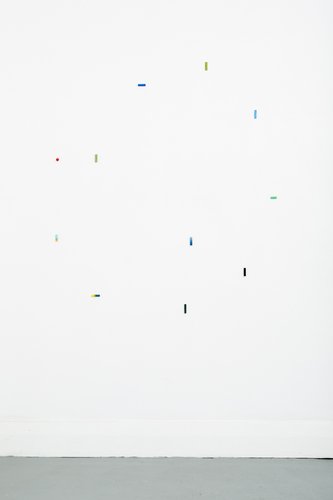




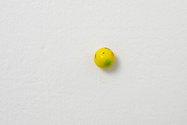
 Advertising in this column
Advertising in this column Two Rooms presents a program of residencies and projects
Two Rooms presents a program of residencies and projects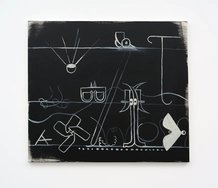
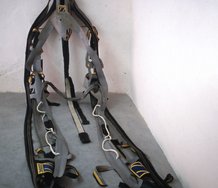
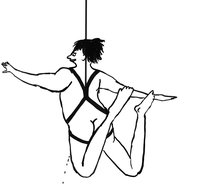
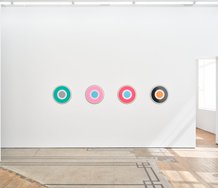
This Discussion has 0 comments.
Comment
Participate
Register to Participate.
Sign in
Sign in to an existing account.